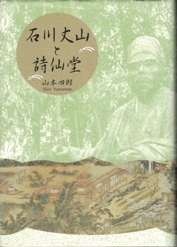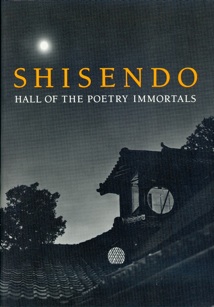Books about Ishikawa Jozan and Shisendo

Shisendo: Hall of the Poetry Immortals. J. Thomas Rimer contributes an excellent biographical essay on Ishikawa. Jonathan Chaves discusses his poetry, including translations of Jozan’s work. The most valuable contribution perhaps, is the translations of the 36 Chinese poems that Ishikawa selected for the paintings that hang in the Shisendo room itself. Stephen Addiss offers an informative chapter on Ishikawa’s unique approach to calligraphy and Suzuki Hiroyuki discusses the design of the villa and garden. A charming short story by Kato Shuichi rounds out the prose section. A generous collection of colour and black & white plates complete this book published by the sadly missed Weatherhill imprint.

When I first bought this book in 2000, I was hoping that it would satisfy my thirst for knowledge about Ishikawa and Shisendo. Instead, it just fueled more research and my desire to write The Samurai Poet.
Shisendo, by Ishikawa Junshi and Mizuno Katsuhiko, is a slim hardcover from a series of books devoted to the beauty of Kyoto’s temples. The photography is evenly split between postcard style pictures and seasonal studies of life in the garden. A nineteen page essay written in Japanese concludes the volume from Tankosha.

Tokugawa Ideology, by Herman Ooms. Ishikawa’s name does not appear once in this book, and yet it provides the best insight into the intellectual climate of early 17th century Japan in which he was an active participant. A great deal of attention is paid to Hayashi Razan, a prominent Neo-Confucian scholar who was also a friend and correspondent of Ishikawa.
Previous: Jozan's Poetry
Next: The Samurai Poet